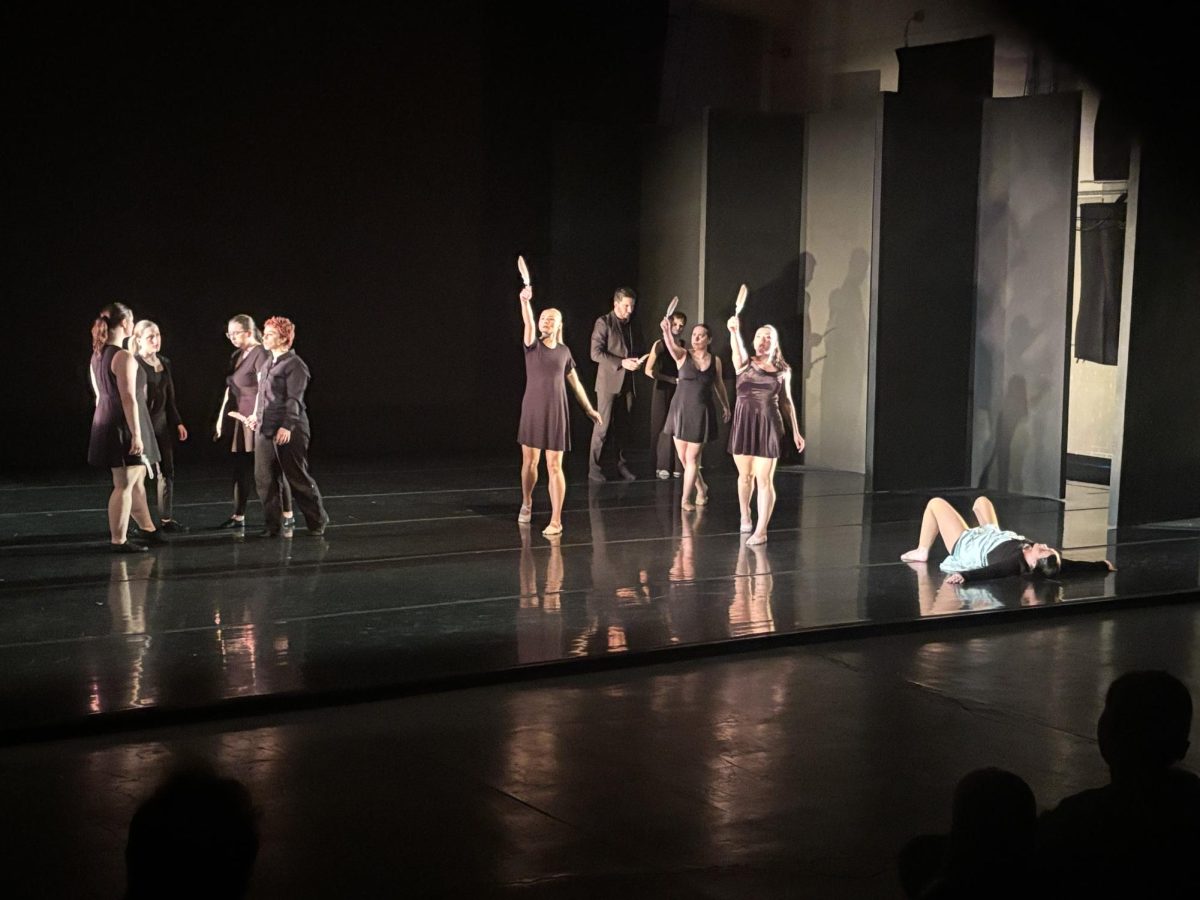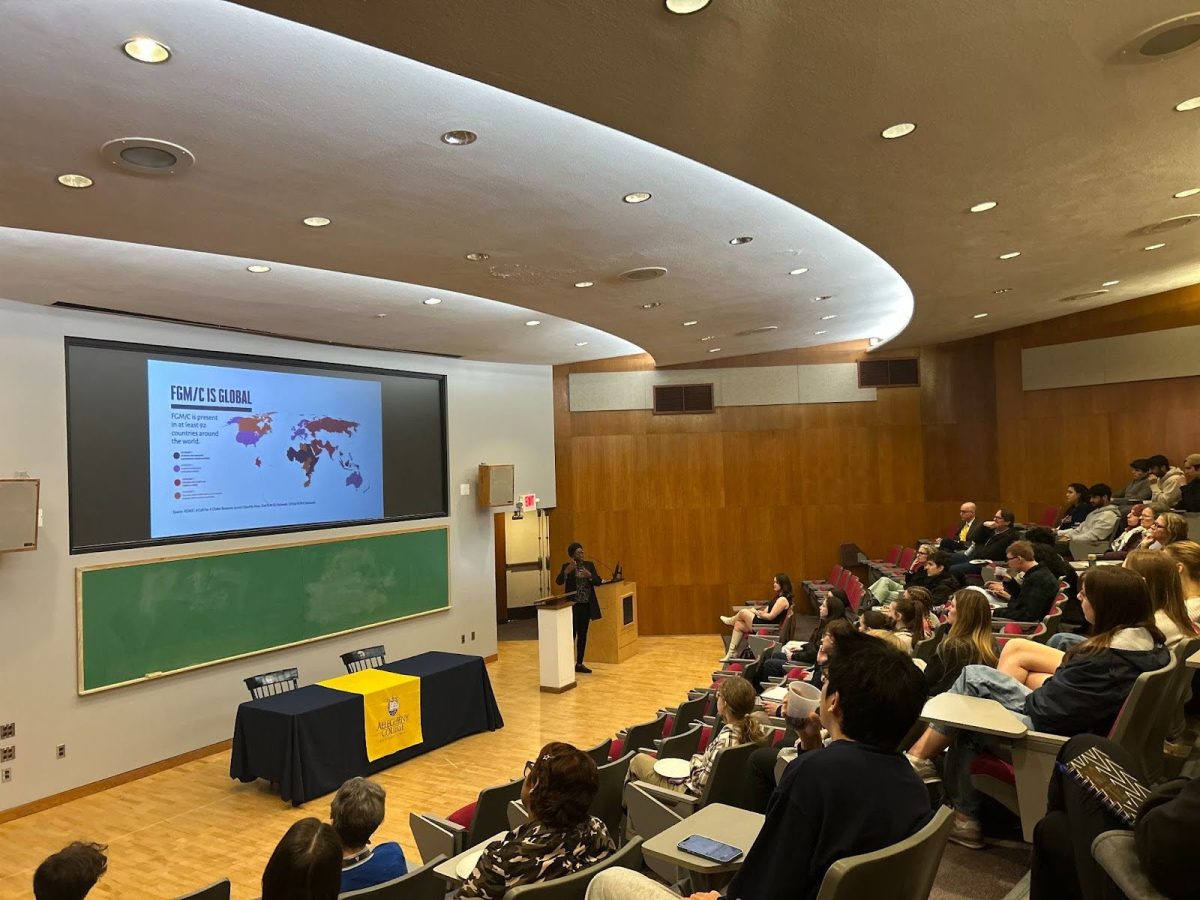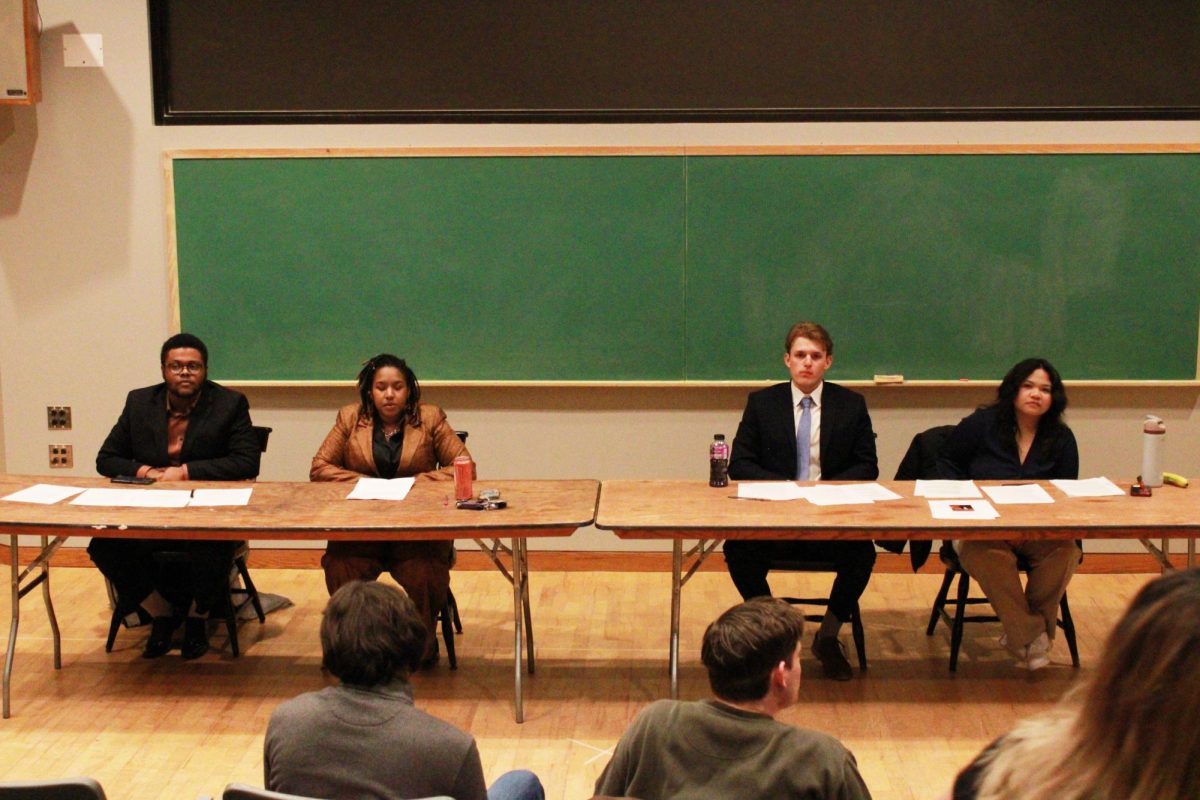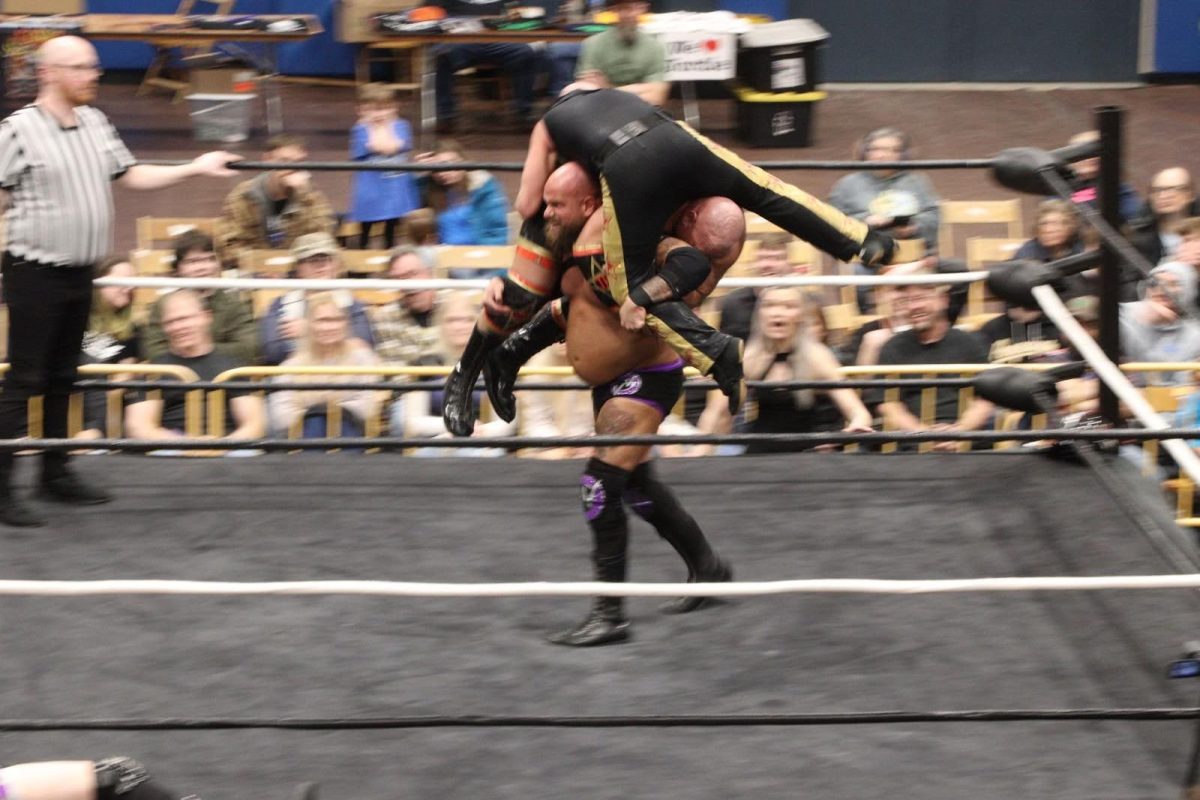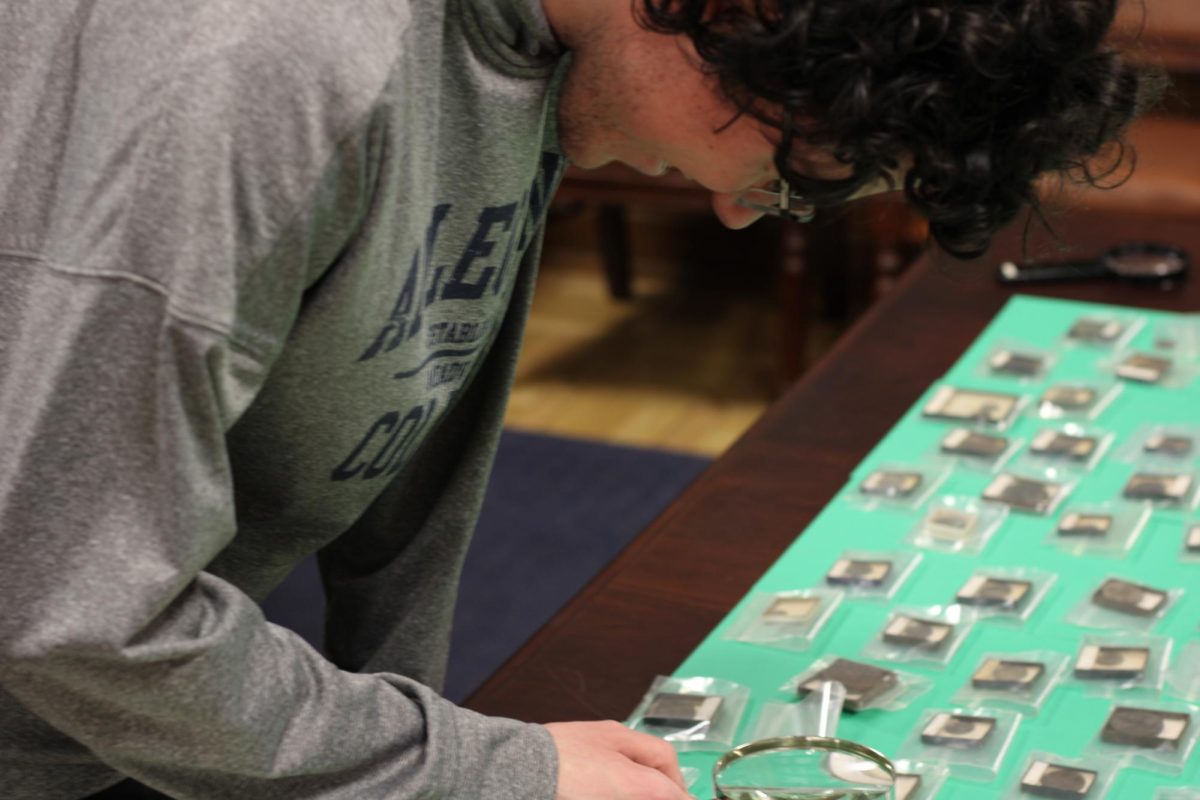Associate Professor of Political Science, researcher and scholar Andrew Bloeser is an expert in his field. As the director for the Center for Political Participation, facilitator of the Law & Policy program and an independent researcher, Bloeser has a deep understanding of the significance of the upcoming election.
Contributing Writer Walker Cunningham, ’25, sat down for an in-depth interview with Bloeser about some of the most pressing issues facing democracy and what it means for Americans to have free and fair elections.
This interview has been edited for length and clarity.
Cunningham: What does the Center for Political Participation do and what is its connection to the Andrew Goodman Foundation?
Bloeser: The Center for Political Participation is currently in its 22nd year at Allegheny College. It was created with the purpose of doing civic engagement work, of helping connect students to the democratic process — both in terms of things like voting and being informed about politics.
The CPP historically has had two significant parts to its work. There’s been a big civic learning component, and then the civic engagement component comes back to things like, “Can we help students register to vote?” And beyond that, perhaps getting involved in political campaigns. The CPP is a non-partisan organization, but we encourage students to pursue opportunities that are in line with their values. We encourage students to get out beyond the classroom and do learning through experience.
The student CPP fellows are involved in a variety of ways. They are doing some of the voter registration efforts on campus right now. They’re also mentors of the Law & Policy program, which is this co-curricular program meant to help students connect academic interests to professional interests and their interests outside the classroom.
Our partnership with the Andrew Goodman Foundation is now into its 10th year. AGF is a 501(c)3 nonprofit, non-partisan organization that specializes in civic engagement work on college campuses, and also civic learning as well. It was founded in the honor and legacy of Andrew Goodman, who was a civil rights activist who was murdered along with Michael Schwerner and James Cheney in 1964 during Freedom Summer. He was in Mississippi to register Black Americans to vote, which was their right, but was murdered by white supremacists who were opposed to that work. We have currently three AGF ambassadors and two of those three are also CPP fellows because the work often overlaps so tightly.
This year, you have helped a lot with getting first-year students registered to vote as soon as they got on campus. Are there any other specific things you will be doing up until the election?
A lot of the credit for registering incoming freshmen (to vote) belongs to the IDEAS Center, (Director) Natalie Brown-Gregg and (Dean for Inclusive Excellence) Dom Turner. The IDEAS Center had a platform during Welcome Week and they wanted to use that platform to talk about the importance of voting and to offer every incoming freshman a chance to register and register here in Meadville if they wanted to. The CPP supported the IDEAS Center in that work. We did that, to my knowledge, for the first time ever at Allegheny College. I think for us as an institution, that was a big step forward. We’ve always been a college that’s prioritized civic engagement. This was a major step that we could take to really demonstrate that.
In terms of other events, we had National Voter Registration Day in September and some other events to get students to register to vote. Our advice to students throughout has been, “Register to vote and request mail-in ballots as early as possible because if there’s any snags, this gives us a chance to help address them.” People should know in general, when it comes to anything pertaining to their voting rights and how to use those voting rights, the CPP is here to help.
Every election cycle – local, statewide, presidential — we always have a shuttle bus that goes from Brooks Walk to the two polling places where Allegheny students vote. President (Ron) Cole, ’87, will be riding with students to the polls at 4:30 p.m. on Gator Day. We will direct you to your correct polling place. If you run into any snags on Election Day, you can contact the CPP and we can help direct you accordingly.
Journalists routinely caution that Americans’ distrust in news media will weaken democracy. What evidence, if any, from our nation’s past is there to support this? Has there ever been an example of a time when journalism was able to create change in our political system?
Distrust in media can be a significant factor in people losing trust in democracy. If people lose trust in the media because they believe the media is misleading them about what’s happening, that can lead people to adopt attitudes and even to take actions that can threaten democracy itself. I think there are legitimate concerns about this. We’re a very polarized country and there’s very polarized media that people can go to to get information.
In the aftermath of the 2020 election, there was reporting by some news outlets that I think led citizens to be skeptical or questioning or even outright denial of the results of the 2020 election. There were over 60 court cases brought by the Trump campaign in which they made allegations of impropriety but did not provide any evidence, and those cases were dismissed or the rulings were against the Trump campaign. But there was reporting that, in some cases, gave credence to these things or amplified some of the allegations.
What that means is that for Americans who were looking for credible information from sources they trusted, they, in some instances, got information that led them to doubt the integrity of the electoral process. If there’s one thing we need in a democracy in order for our democracy to remain stable, secure, healthy, is we need to be able to trust in free and fair elections. That is a cornerstone of democracy.
There are conservative media outlets attempting to talk to conservative audiences to say, “Here’s what’s reasonable in terms of concerns, and here’s what doesn’t have evidence.” But when you get these narratives out there that the election results are illegitimate, this is what can mobilize — even if it’s a small number of people — to take actions like what we saw on Jan. 6. That took us to a really dark place that day. There were people who were killed, injured, and whose lives were threatened.
Hopefully, we will not see any sort of repeat of that (and) there will not be any information out there that stirs things up. This is where I think journalism does have a really significant role to play in trying to dispel those things as quickly as possible and build credibility with an audience. Even among news outlets that might be labeled as partisan, some of the standard practices of good journalism still apply. There are some good people at those news organizations trying to do their jobs well. The importance of those jobs are never more important than what they are right now.
Presidential candidates often frame their campaign as the campaign that’s going to fix the country. How does that framing influence the average citizen’s trust in our political system?
There’s no harm in campaigns arguing they are going to be the ones to fix problems or to have identified problems other politicians have ignored. We should not be bothered by debate and disagreement and people making claims that they understand the problems people are experiencing around the nation and can help solve those problems.
Where things can take a dark turn is depending on what’s being promised to citizens. As a scholar of American politics, I would ring the alarm bell when you hear presidential candidates talking about retribution, promising revenge, and then targeting specific politicians or particular groups in society.
When you start to hear things like allegations that immigrant communities are eating people’s pets when there’s no evidence of this — we have seen that happen in Springfield, Ohio — those types of things from, in this case, the Trump campaign do concern me. Talking about the enemy from within and then naming a politician that you’re opposed to and doing that in the same breath when you’ve talked about mobilizing the military to address domestic problems or deal with domestic threats, is something that raises a concern. With Trump, we know there’s a certain amount of hyperbole. Nonetheless, people hear that and they can internalize it. These are things that are out of step with traditional democratic campaigning over issues and are the kinds of things I worry can do damage to a democracy.
One can certainly find criticisms to make of the Harris campaign. Has Tim Walz misspoke about parts of his record? Has Kamala Harris been able to defend her positions on fracking? There are critiques one can make of both sides.
But there’s also an asymmetry here. We should be attentive to where some of those promises or some of the problems that have been alleged aren’t backed by evidence and might stir up forms of prejudice and hatred that don’t make us a better country.
Kamala Harris’ opponents express concern that President Biden’s last-minute withdrawal and subsequent endorsement of Harris was anti-democratic because most Democratic primaries were over, leaving voters with no clear avenue to elect a nominee themselves. From your perspective as a researcher and scholar, is it an accurate characterization to say the process was undemocratic? Is this a threat to democracy?
I don’t think Joe Biden stepping down as the Democratic Party’s nominee and Kamala Harris then stepping in as the nominee is a threat to democracy. The political parties are private organizations and they have bylaws, procedures they follow for how they’re going to select a nominee. The Democratic Party moved forward with rather an unorthodox approach to arriving at its nominee, but not one that appears to have violated any of the Democratic Party’s bylaws to my understanding.
Where there is a word of caution is that you would ideally like the will of the voters in the Democratic primary to have chosen the candidate and for that candidate to persist all the way to Election Day. I think there are legitimate critiques to be made. There could have been conversations had in earnest much earlier to see if Biden would step down before the Democratic primary. In my view, that’s always the better way to go about it because that to most people feels like a better process. You can draw a direct line from who wins those primaries and caucuses to who is the nominee.
Moving forward, I hope the lesson learned from this is for leaders and political parties to think really carefully about the timing of when primaries happen and when you might need to make decisions so that there aren’t questions that come up around these sorts of issues, because I do think there are people who are reasonably frustrated.
Donald Trump’s opponents often cast him as a threat to democracy. Meanwhile, his supporters critique this framing as politicized exaggeration. From your perspective as a researcher and scholar, is it an accurate characterization to say Donald Trump is a threat to democracy?
I think it has been true that Trump has contributed to some threats to democracy. Yes, Trump has in the past been a threat to democracy.
Even before people went to the polls on Election Day, (he) began saying things like, “The only way we can lose is if the other side cheats.” He said some version of this in 2016, said it again in 2020. There was not evidence there was some orchestrated campaign for Trump’s opponents to cheat or organize systemic voter fraud, but he alleged that both times. Sowing doubt about elections where there’s not evidence to support that is dangerous. Systemic voter fraud is a really big deal, so if there’s credible evidence to support that, we should take that seriously; likewise, we need to take seriously when people make allegations that are unsupported or actually contrary to evidence. This is what Trump did in the aftermath of the 2020 presidential election.
Then, of course, on Jan. 6, having that rally, saying people could process to the Capitol because there was an injustice that was done that day, not having mobilized the National Guard, not having publicly called for an intervention until well into the events that transpired was also, I think, very irresponsible.
So, as someone who studies this, I would say yes, there are some really appropriate concerns about Trump being a threat to democracy. As events unfold in 2024, we should not presume that anyone is going to do anything that is bad and will jeopardize democracy. But if there is conduct from any politician that undermines confidence in democracy where there’s not credible evidence to support those allegations, we should be concerned about those things, and we should judge those things appropriately.
In Pennsylvania, students have heard over and over that every vote counts. In other states, people feel as though their votes don’t count because of the electoral college. What would you say to people who are from states where all electoral votes will almost certainly go to one candidate? Does the framing of “every vote counts in Pennsylvania” reveal that not every vote does count in other states?
My expectation would be that everyone’s vote who is a registered voter and legally eligible to vote will be counted.
With respect to the Electoral College, the Electoral College does have the effect of disproportionately weighting the votes of some states more than others. The reason the Electoral College vote differs from the popular vote is that there are states with smaller populations that have electoral votes that are disproportionate to the size of their population. This means if you win in the right states, you can win the Electoral College vote, while losing the popular vote. That’s happened a few times in the last quarter century.
There is reasonable concern and frustration for this. One does begin to worry that if you have too many elections where the popular vote goes one way and the Electoral College vote goes the other way, do people say, “Is this violating the principle of one person, one vote?” That requires a larger national conversation about what the value of the Electoral College is. These are going to be matters of increasingly serious debate if we continue to see the popular vote and the Electoral College vote go in different directions.
What is one thing you wish students understood about this election or voting more generally?
Hopefully, the thing that students understand, that Americans generally understand, is that democracy matters. Democracy matters because it gives us the freedom to participate in decisions that affect our own lives, the lives of our friends and neighbors, the life of our community, the future of our nation. That’s really important and we shouldn’t take that for granted. At a time when it’s easy to feel cynical or alienated, (it is) important to recognize we have this really important right that’s recognized in a democracy — that you get to have some say in it. I hope all Americans thinking about voting appreciate that right because that right is not recognized in other kinds of political systems.
Beyond casting that vote, there are a variety of other ways citizens can get involved in their democracy. You can work for campaigns you believe in (and) advocacy groups. Now, you also have to recognize that some of your fellow citizens may very much disagree with you and do the same thing you’re doing, but toward goals you disagree with. But appreciating that is part of what it means to appreciate democracy. We might want to find more constructive ways of having political debates in this country, but we don’t want to confuse that with not valuing debate and disagreement and competition over ideas.
My advice to anyone who sees troubling things in American democracy is to get involved and encourage others who feel the same way you do to get involved as well.
Pollsters have said there is no way for us to accurately predict the election outcome. Many have also said it is unlikely we will know the outcome on Election Day, since the race is so tight. When will we know?
I can’t know definitively the results. I think pollsters are right to caution that right now in a number of states (it) is literally too close to call. While you may see an average of polls saying, “Trump is a little bit ahead in this state,” or, “Harris is a little bit ahead in this state,” the reality is that polling is not perfectly accurate. Even if it’s reasonably close, it can’t call elections this close. As people are reading headlines, anytime you see that it’s within the margin of error, realize that we just do not know yet and that the way we will know is by counting votes on and in the days after Nov. 5.
It could very easily take a couple of days after the election before all votes are counted. In some states, votes won’t be counted until polls close. In other states, ballots that have been cast early can be counted going into that day. My advice to anyone who’s following this is to be patient with the process and to wait until there is sufficient evidence during the vote-counting process to declare a winner.
If any candidate in the presidential election or anywhere down-ballot declares victory before we have a definitive vote count, I would urge everyone just to have a sense of caution and a sense of patience until we get all the way to the end and count every vote that’s been legally cast. This is a moment where we have to let those processes play out and ensure those processes have integrity.
Do you have any predictions about election outcomes?
No, it’s a very close election. It’s going to matter which campaign executes strategy better in some of the most critical areas around the states that could be pivotal. I think it’d be irresponsible of me to say, “I think the outcome is going to be this way or that way.”
Really, it’s a matter of just watching things carefully on Election Day and then figuring out, regardless of who wins, what comes next and what is a constructive path forward for us all as Americans. Because no matter who wins, I think it could be a bumpy ride. There’s a lot we need to do to repair the fabric of American democracy, and that’s going to continue well after the 2024 election. Hopefully, we all take that obligation as citizens and as Americans seriously.





